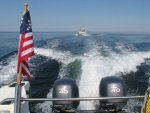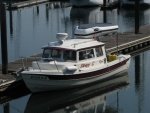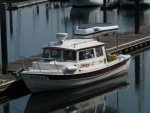Most of the high hour motors (3,000 hours on up) are run daily, mostly in commercial operations, such as LEO or CG, Tow Boats, and a few charter operations (Many charter operations, use "program motors", sponsored by an outboard company with trade ins every year or two,)
I would have a good mechanic not only do compression tests, also but leak down, have the thermostats looked at (this also gives a chance to see internal corrosion), I don't know if there are any internal anodes in the 40's, but many outboards have them, which are neglected. If possible I would have bore scope inspection done also.
Although I have owned a number of Hondas, my experience is that they have a slightly higher incidence of corrosion in salt water.
A lot depends on how well the engines were maintained and run. But if buying a boat with 2500 hours on the engine, I would factor in the cost of new engines shortly. A close friend bought a boat recently, and although it less than 1,000 hours on the engine, it failed shortly after purchase. The replacement cost $15,000--a big hit on top of the purchase price! (150 hp)
Buyer beware.



